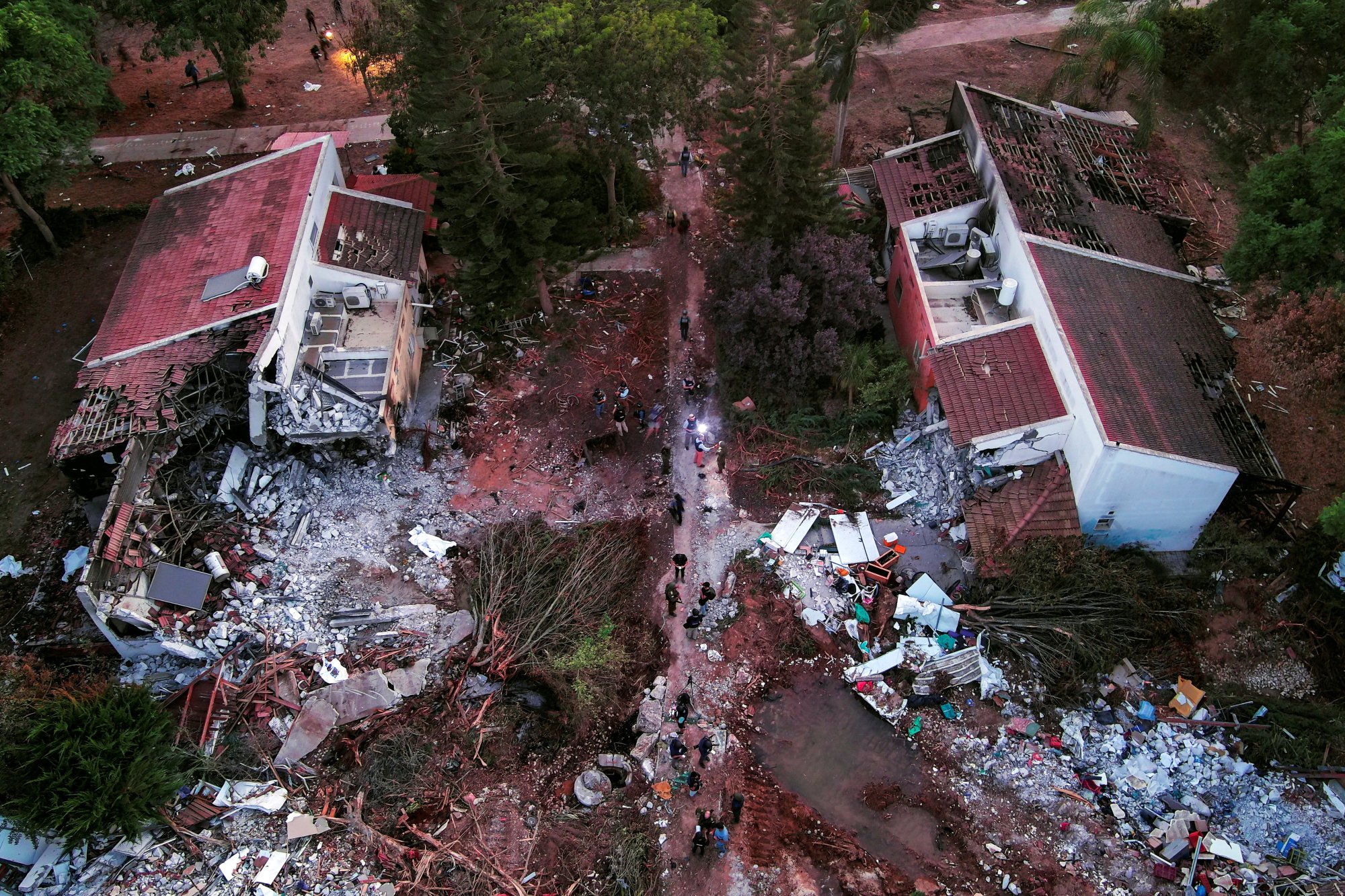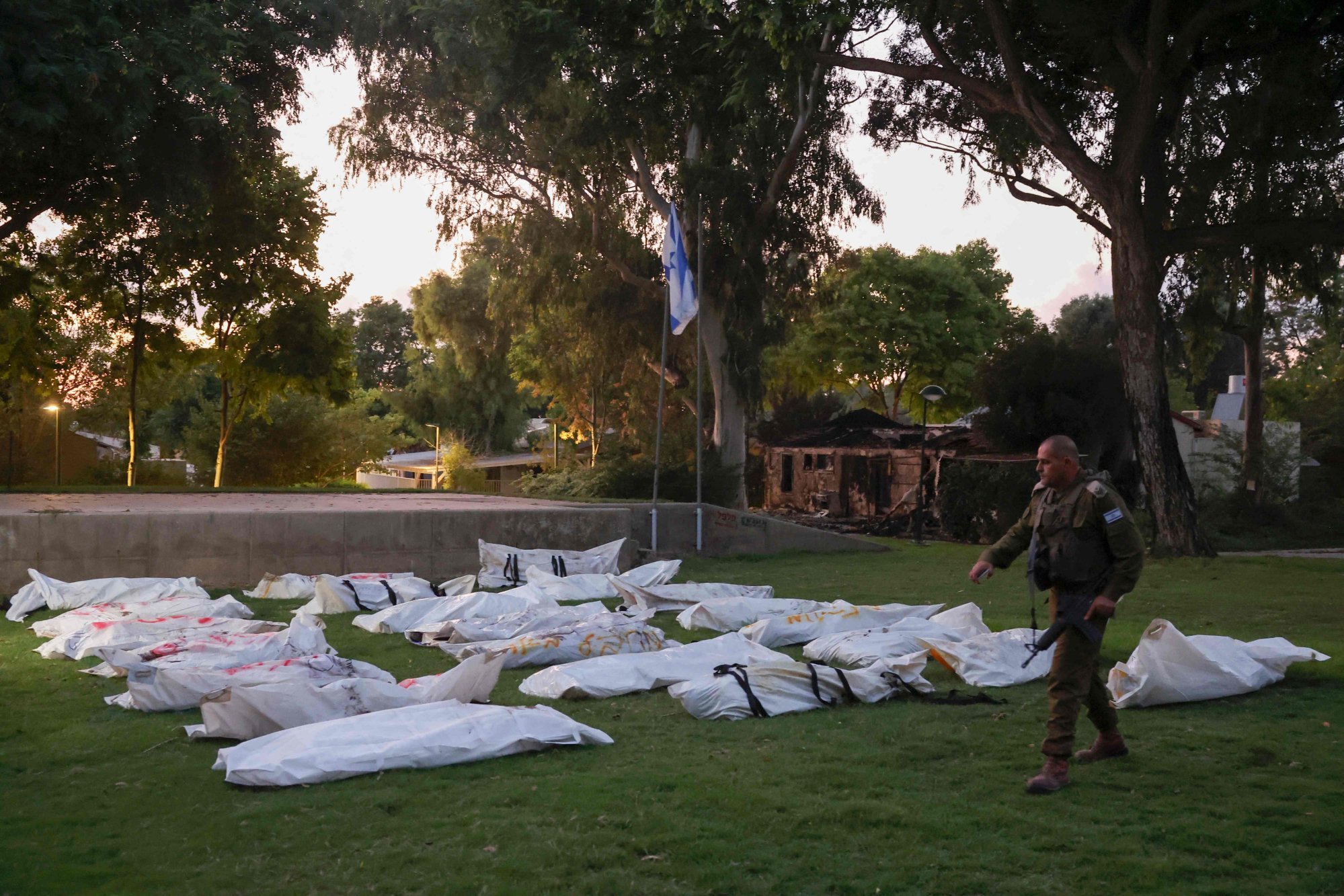
Horrific scenes in Israel’s Be’eri Kibbutz where Hamas militants killed 100 men, women and children
- The Be’eri Kibbutz, less than 5km from the Gaza border, is one of more than 20 towns and villages ambushed by Hamas on Saturday
- Israeli officials said that Hamas militants killed at least 100 residents in Be’eri, while others were taken hostage back to Gaza
Trudging down a cul-de-sac turned to rubble, an Israeli army commander stopped in front of one scorched home, its front wall blown wide open. Look at what Hamas militants have done, he said, to this close-knit community that only days ago brimmed with life.
“Children in the same room and someone came and killed them all. Fifteen girls and teenagers, they put (them) in the same room, threw in a hand grenade and it’s over,” Major General Itai Veruv said.
‘This is a massacre. It’s a pogrom,” he said, recalling the brutal attacks on Jews in Eastern Europe in the 19th and early 20th century.
The Israeli military led a group of journalists on a tour of this village a few kilometres from Israel’s fortified border with Gaza on Wednesday, following an extended battle to retake it from militants.
Before Israeli forces prevailed, the attackers killed more than 100 residents, Israeli officials said.
Gaza’s civilians paying the price as Israel strikes back against Hamas
Before the attack, Be’eri – started by Zionist settlers two years before the country itself was founded – was known for its industriousness, including a large printing plant that turns out Israeli driver’s licenses.
Now it has become a horrific symbol of the war with Hamas, which authorities say has so far left about 1,200 dead in Israel and about 1,200 in Gaza.
Veruv, who had retired from the military until he was recalled on Saturday to lead forces fighting to regain control of towns that were attacked, said Hamas fighters had taken up entrenched positions in the ruins, hiding in small groups before surprising Israeli soldiers as they went from house to house.
“Every time that we thought we cleaned the area and everything was silent, suddenly another 12 or another 20 got out,” he said.

Standing in front of the two-storey stucco home where he said militants killed teenagers with a grenade, he said soldiers had found the bodies of other residents with their wrists tied together.
During the short visit, a reporter saw gaping holes smashed in the side of some homes and torched cars. Framed family photos lay amid the ruins, along with a children’s backpack.
Outside, items brought by the militants hinted at meticulous preparation. Prayer rugs and extra shoes lay scattered on the ground, not far from a toothbrush, containers full of medicine and rifle magazines.
A pair of Toyota pickup trucks, one with a machine gun mount, also remain.

By the time reporters were brought in a little before sunset on Wednesday, rescue crews had removed the bodies of most of the residents who were killed. But the corpses of several militants remained and the odour of death was overpowering.
Israeli paramedic Hami Atias was one of the first-responders who went into Be’eri.
“I thought I’d seen enough but nothing could prepare me for what happened there. The smell of bodies – as many times as I’ve showered this week – I can’t get that smell out,” said the 36-year-old.
Atias said he saw the bodies of scores of men, women and children who had been gunned down or blown up by militants.

“There were bodies lying on the street in huge quantities, wounded people screaming for help, and we had to decide who to treat because we didn’t have enough manpower,” he said.
“It was disgusting.”
Militants killed indiscriminately and kidnapped children and elderly people, said witnesses and family members.
“My son was kidnapped. He’ll be 16 years old in two weeks,” said Mir Shani, a 46-year-old physiotherapist from Be’eri.

Militants stormed Shani’s ex-wife’s home, got into the shelter she and her children were hiding in, and took all males present – Shani’s son, the father of another family from the kibbutz and another boy, Shani said.
“They took them … into a black car and they drove away,” he said. “I believe he’s alive and hope he’s being treated well. I’m hopeful he’ll come back.”
Be’eri resident Golan Abitbul said he got into a brief gunfight with militants.
“I saw a group trying to enter my front yard. I opened fire and they replied with a burst. I don’t know why but they decided to go away,” he said, speaking from a hotel near the Dead Sea where victims and families were still taking shelter.

“I hope we get all our friends back from Gaza,” he said, referring to the scores of Israelis Hamas has taken back into Gaza as hostages.
Hamas has threatened to execute hostages in retaliation for Israeli bombings.
Nahar Neta, a Be’eri native who lives in central Israel, said he knew nothing of the fate of his mother, missing since the attack, but assumes she has been taken hostage.
Neta and his siblings were speaking to his mother on the phone trying to reassure her while militants stormed her home, and then got cut off.
“We haven’t heard anything from my mom or anything else regarding her whereabouts,” he said.
“Our conversation when the terrorists entered her home was the last contact we had.”
Additional reporting by Reuters

